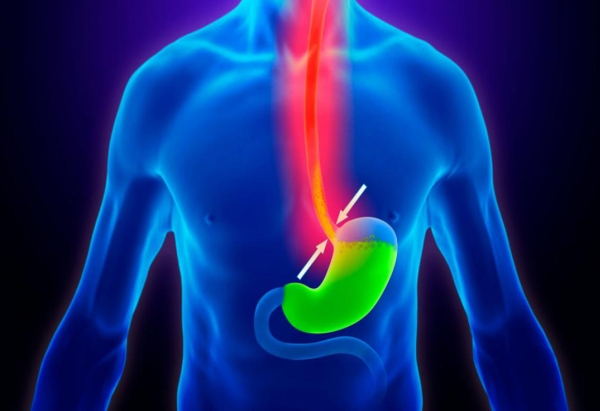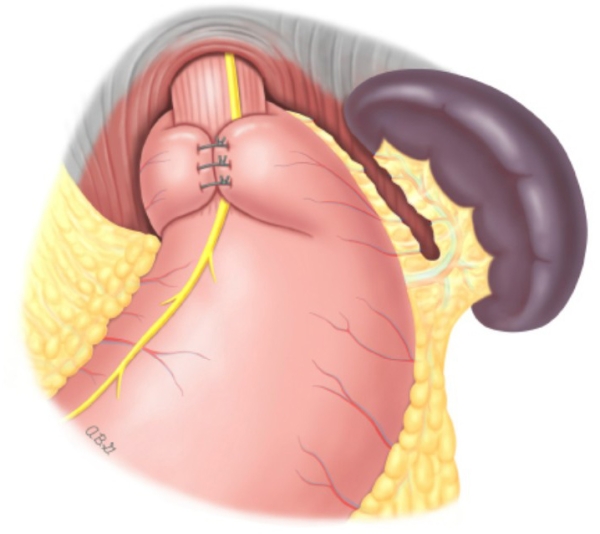Hiatal Hernia: Diagnosis & Surgery

Do You Suffer from Heartburn, Reflux, or Persistent Pain? It Could Be a Hiatal Hernia
A hiatal hernia occurs when part of the stomach moves upward through the diaphragm and into the chest cavity. This condition is often associated with gastroesophageal reflux disease (GERD), leading to symptoms such as:
🔹 Heartburn and a burning sensation in the chest.
🔹 Acid regurgitation or reflux after eating.
🔹 Difficulty swallowing or a feeling of pressure in the throat.
🔹 Abdominal discomfort or pain that worsens after meals.
In some cases, hiatal hernias may not cause symptoms, but if they become severe or complications arise, surgical treatment may be necessary.
When Is Surgery Recommended?
Surgery for a hiatal hernia is considered in the following cases:
🔹 Reflux that does not improve with medication or lifestyle changes.
🔹 Complications such as esophagitis, esophageal narrowing, or ulcers.
🔹 Large hernias that cause difficulty swallowing or persistent pain.
The goal of surgery is to repair the hernia and strengthen the esophageal sphincter to prevent acid from flowing back into the esophagus.
Diagnosis and Preoperative Tests
Before recommending surgery, a comprehensive evaluation is performed, including:
🔹 Upper endoscopy: Examines the esophagus and stomach for signs of inflammation or damage.
🔹 Esophageal pH monitoring: Measures acid levels in the esophagus to confirm reflux.
🔹 Esophageal manometry: Assesses the muscle function of the esophagus and its ability to move food properly.
These tests help ensure an accurate diagnosis and a personalized treatment plan.
Surgical Treatment Options
When surgery is the best option, techniques are used to repair the hernia and improve reflux control. One of the most common procedures is the Nissen fundoplication, where the upper part of the stomach is wrapped around the esophagus to prevent acid from rising. This technique significantly reduces reflux symptoms.
Another alternative is the Toupet fundoplication, a less restrictive approach that also enhances sphincter function and relieves symptoms. Both procedures are performed using laparoscopic surgery, allowing for a faster recovery, less postoperative pain, and minimal scarring.
The surgeon will evaluate each case to determine the most suitable technique for every patient, ensuring a tailored treatment plan. 
Recovery and Expected Results
Recovery after surgery is generally quick, especially with minimally invasive techniques. Patients often experience:
🔹 Reduced reflux and heartburn.
🔹 Improved ability to swallow.
🔹 Less abdominal discomfort and a better quality of life.
Most patients can resume their normal activities within a few weeks, following medical recommendations.
Your Health, Our Priority
If reflux and discomfort are affecting your daily life, it’s time to find a long-term solution. We use advanced technology and a specialized team in hiatal hernia surgery to provide safe and effective treatment tailored to your needs.
Don’t let symptoms control your life. Schedule a consultation and discover the best treatment option for you.
Patients Reviews
⭐⭐⭐⭐⭐ Dr. Alevizos is incredible. He explains everything patiently and always with a great attitude. From the very first minute, he made me feel calm and in good hands. You can tell he genuinely cares about how you’re doing and not just about solving the problem quickly. If you’re looking for a surgeon who truly cares about you and is amazing at what he does, he’s the one.
Carlos B
⭐⭐⭐⭐⭐ A great professional from the very beginning. During the consultations, he thoroughly understood my case, always approachable and reassuring. The procedure went as well as expected, and with the treatment I’m following, I’ve improved significantly.
I’m truly grateful to have been in good hands.
Manu P
⭐⭐⭐⭐⭐ For me, it has been an enormous stroke of luck to put myself in his hands for a pathology that is so difficult to treat and complicated to resolve. My most sincere thanks and all my love to Dr. Alevizos
NGQ
⭐⭐⭐⭐⭐ I have been operated on twice by Dr. Alevizos, and without a doubt, he is a great professional who is caring and deeply involved with his patients. I felt absolute peace of mind in his hands. Thank you for everything, Dr. Leonidas!
Francisco J
⭐⭐⭐⭐⭐ Without a doubt, Dr. Leonidas is a spectacular surgeon, in addition to providing gentle, kind and reliable treatment. I was lucky enough to be operated on by him for a pilionidal cyst after having previously been operated on twice without obtaining good results... until I put myself in the hands of Dr. Leonidas, who thanks to his intervention after almost two years, I am in perfect condition. been and I haven't had any problems again!
Alejandro R
⭐⭐⭐⭐⭐ His patience, kindness, and professionalism throughout the whole process—from diagnosis to surgery and discharge—gave me peace of mind and helped me cope in the best possible way.
Truly grateful
MTT
⭐⭐⭐⭐⭐I had stomach surgery by surgeon Leonidas Alevizos and noone can imagine the great quality of life he gave me. His history with me was always his absolute concern for my digestive problems and there was not a single consultation in which I did not feel understood or supported. His psychology with me was excellent, my post-operative period was very monitored by him and I could not have felt more cared for at the time when I felt most vulnerable.
MLS
⭐⭐⭐⭐⭐Grateful from the first moment for the humane treatment that the doctor gave me. He was attentive to any problem or doubt
Agustín H
Your Well-being, Our Expertise
